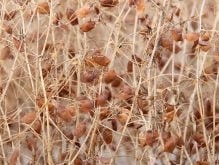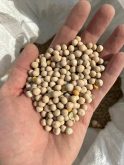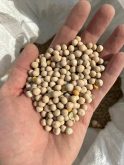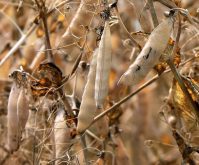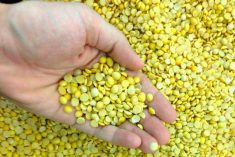Winnipeg | Reuters — France’s Roquette, which is building the world’s largest pea protein plant in Manitoba, is counting on the province’s farmers to boost their production to supply the $400 million factory, the company said Friday.
Roquette raised eyebrows this week when it said it would build the plant in Portage la Prairie, Man., rather than in Saskatchewan, which grows 14 times more peas.
The plant would consume the equivalent of nearly all of Manitoba’s current pea production.
Family-owned Roquette picked Manitoba for reasons that include transportation links and access to hydroelectric power, said spokeswoman Carole Petitjean.
Read Also

U.S. grains: Corn, soybeans recover from 3-month low on technical bounce
Chicago | Reuters – Chicago corn and soybean futures steadied on a technical bounce on Wednesday after sliding to their…
“We are confident that, in good collaboration with local farmers, local production in Manitoba will increase substantially in the next five years,” she said in an email.
Petitjean did not say how much Roquette expects Manitoba pea production to grow but said the plant would process more than 100,000 tonnes of the crop annually once it opens in 2019.
The company previously noted it also expects to source up to 150,000 tonnes for processing at facilities in France.
Roquette will also rely on neighbouring Saskatchewan, Petitjean said.
The Manitoba plant is expected to help meet fast-growing demand for vegetable protein in food and pharmaceutical products. Pea protein, extracted from yellow peas, is used in nutrition bars, soups, sauces, pasta, biscuits and meat alternatives.
Canada is the world’s biggest pea producer.
Manitoba grew 164,200 tonnes of peas last year, the most in 14 years, but a fraction of Saskatchewan’s 2.3 million-tonne crop, according to Statistics Canada.
Francois Labelle, executive director of Manitoba Pulse and Soybean Growers, said price would determine how much more peas farmers will plant. The crop could displace sowings of wheat, canola and soybeans, Labelle said.
Compared to Saskatchewan, Manitoba has many other crop options, he said, also noting edible beans and corn. Past disease issues and poor yields have also led to reductions in Manitoba’s pea area over the years, he added.
That said, “when you have a local buyer, it’s always easier to attract crop,” he added.
It’s unclear whether the plant will stimulate more Manitoba pea output, with soybeans also becoming a more popular choice for farmers, said Brian Clancey, publisher of agriculture website STAT Communications. But Roquette probably will not have trouble finding enough supply, he said.
Regina-based AGT Food and Ingredients, a major pea processing competitor, does not buy many peas from Manitoba, said CEO Murad Al-Katib.
“Roquette announcing that (plant) is great for western Canadian pulse growers, and ultimately you can’t ignore the trend,” he said. “Gluten-free, high-protein, high-fiber non-(genetically modified) ingredients are viable food.”
— Rod Nickel is a Reuters correspondent covering the agriculture and mining sectors from Winnipeg. Includes files from Phil Franz-Warkentin of Commodity News Service Canada.




